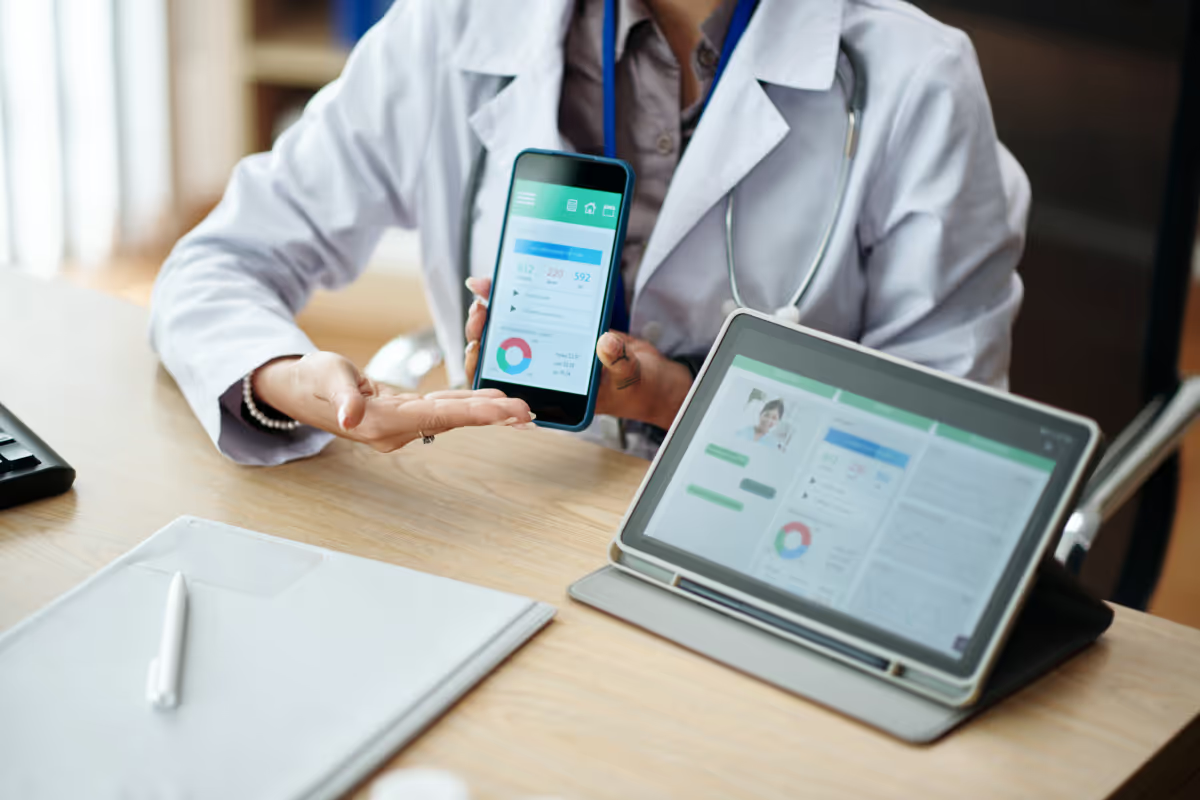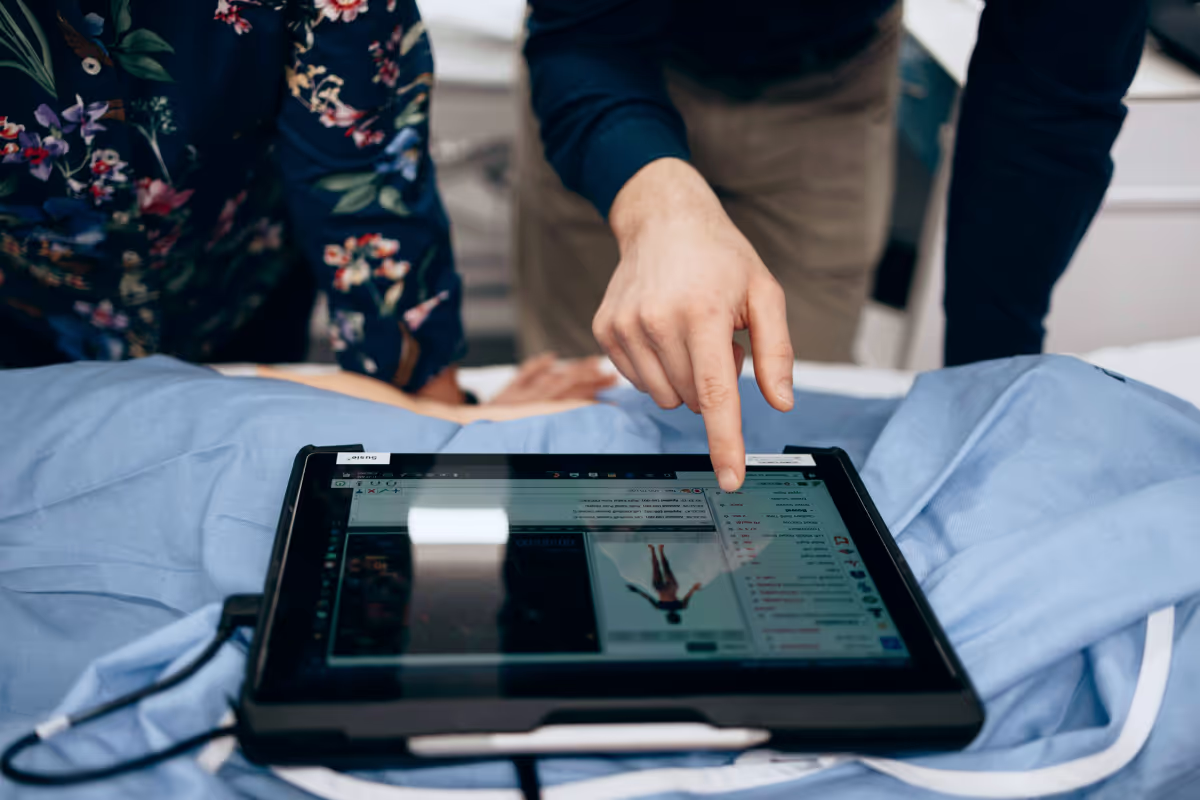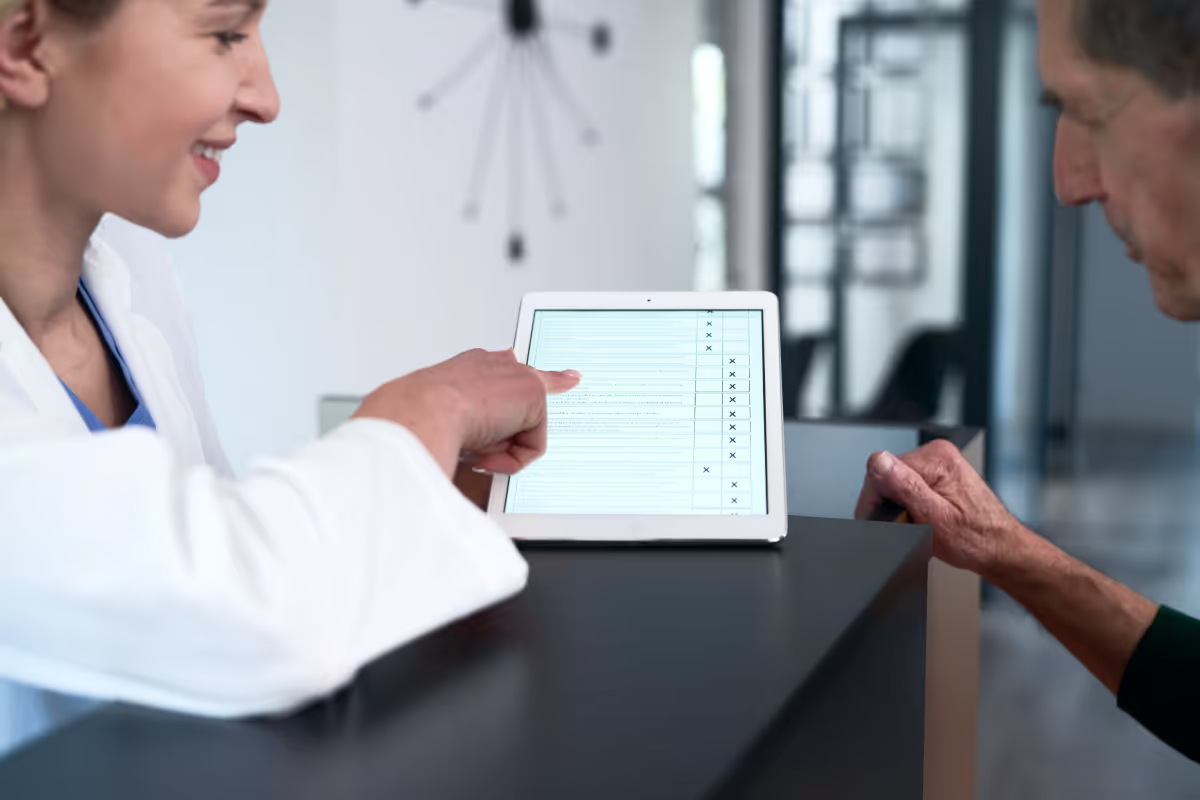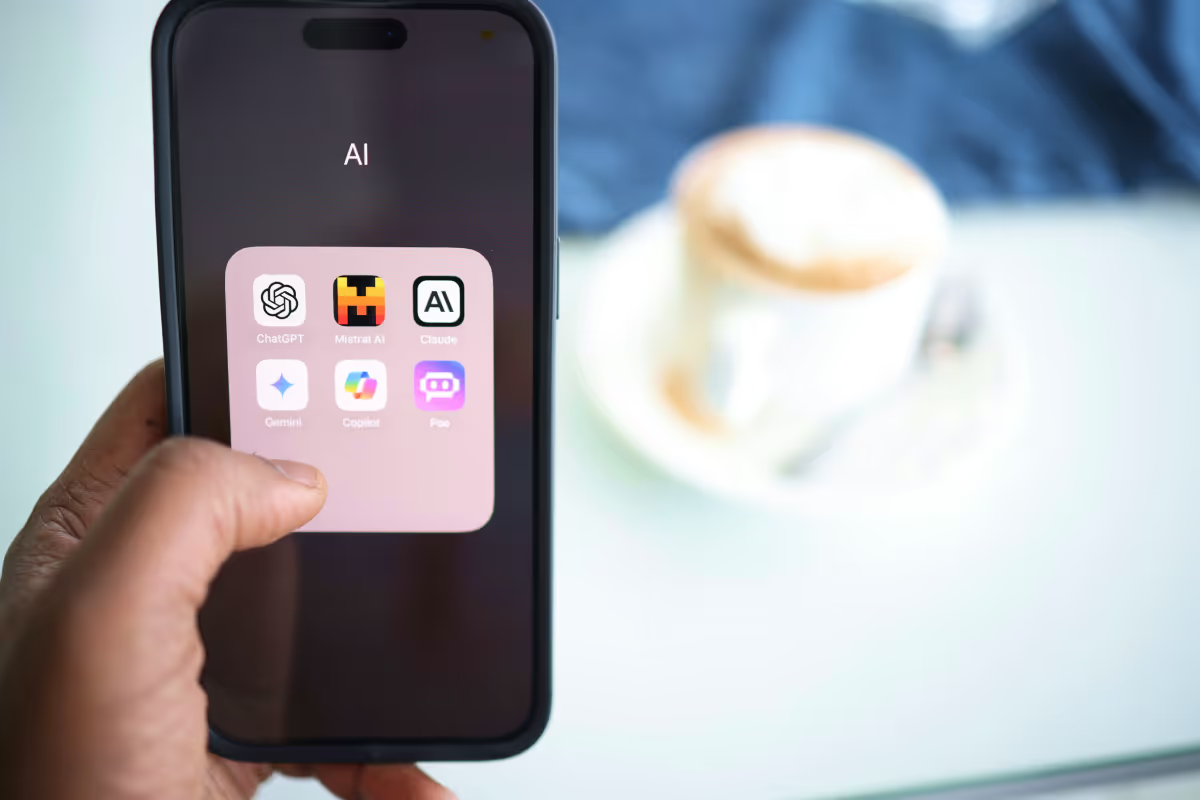If you’ve ever tried to build an app, or even just planned one, you know the feeling: everyone’s asking for dates before you even have wireframes. Investors want a launch window. Your team wants a roadmap. And you’re just trying to figure out how long this whole thing will actually take.
That’s why “How long does it take to make an app?” is the second most common question we hear from clients (right after “How much will it cost?”). You can find our detailed answer to the first one here, and I’ll focus on the second one — time.
Paradoxical as it may sound, building an accurate development timeline takes time and, more importantly, experience.
Over the past six years of my work at Uptech, I've made numerous time estimations for both early-stage startups and established companies. I know for sure how important the app development timeline is to meet investors' requirements and product deadlines.
So today, I’ll share with you a detailed time breakdown for each stage of app development with real numbers and cover the following topics:
- How long does it take to build an app from an idea to a full-fledged product?
- What are the most time-consuming stages?
- What are the factors that impact the app development timelines?
- How can you speed up the app development process?
There’s a lot to cover, let's dive into it.
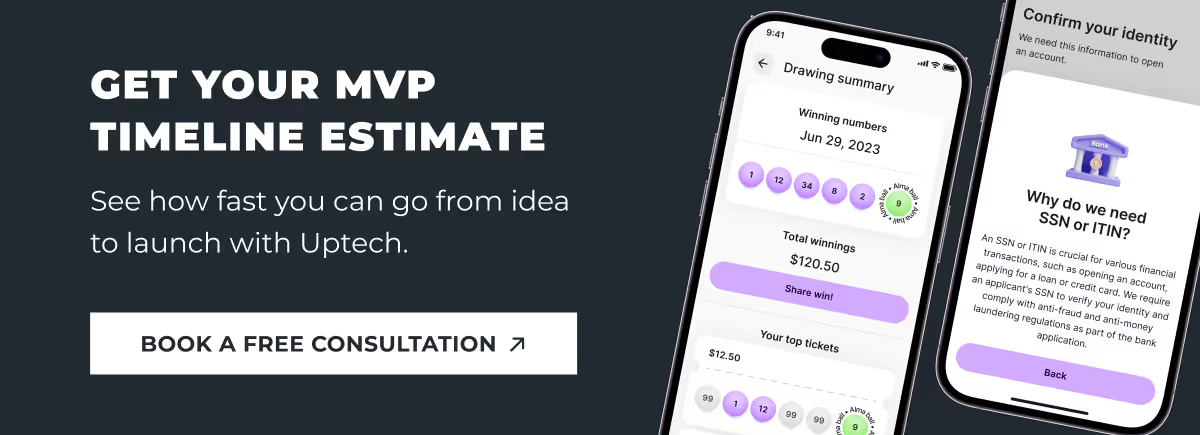
How Long Does It Take to Develop an App: In a Nutshell
On average, building a fully functional app takes from 4 to 7 months.
However, this range can shift significantly depending on the app’s complexity, the number of features, team size, and developers’ expertise. The more integrations, design depth, and user flows you add, the longer the process naturally becomes.
Simple apps
These are straightforward, often template-based products with minimal custom code and no external integrations. They include basic functionality and a clean, simple interface. Such apps don’t use application programming interfaces (APIs), meaning they operate offline or store data locally without syncing to cloud services.
Because of their simplicity, development can be completed within 2–4 months. For example, PNKYSWR. We spent approximately 4 months creating the React Native app to meet the needs of Android and iOS users quickly.

Medium complexity apps
These systems are more feature-rich than simple apps. Medium complexity apps usually include a custom interface, multiple screens, and third-party integrations.
For instance, they might allow users to log in via social media, use native device features such as GPS, camera, or notifications, and synchronize data with cloud databases.
Their balance between functionality and scalability makes them the most common category for startups.
Apps of medium complexity take about 4-7 months to develop.
A good example is apprvl.com — a part of the photo studio Squareshot. This platform for reviewing commercial photos took us 5 months to code.

Or a fitness tracker app that tracks physical activities using the device's sensors (for example, steps, heart rate), integrates with third-party devices (like wearables) and apps, offers basic workout plans, and tracks progress.
Complex and large-scale apps
This software comes with advanced functionalities, a high-level backend, high performance, compliance, and security requirements.
Large-scale apps integrate with multiple systems and synchronize with cloud services. They handle complex user interactions such as real-time data exchange between multiple users or systems, in-app communication features like chats or live video, secure payment and transaction processing, and instant data synchronization across platforms.
The development time of complex apps can range from 7 to 12 months and more.
Good examples are Yaza and Nomad. These apps' functionality is a lot more complicated. It includes 2 or more user roles. Additionally, the listings search and video recording features required more time.


Another example is a complex mobile banking app that offers secure multi-factor login, real-time account insights, different payment options, money transfers, mobile check deposits, integrated financial planning tools, and customer service features.
These are just a few examples of different apps and their development times. Keep in mind that every app is different, and complexity is only one of many factors impacting the project timeline.
For instance, in Uptech's Dyvo project, despite the app's advanced AI capabilities for generating art and avatars from photos, we completed development in approximately 2 months.
This became possible thanks to our strategic use of no-code platforms, which streamlined the process and allowed for rapid deployment.
App Development Times by Stages
Every step of the software development process shapes the overall timeline of bringing an app from concept to launch. Each phase has its own goals, deliverables, and potential bottlenecks that can either speed up or delay progress.
Here, we're breaking down the typical durations for each app development phase, helping you understand what to expect as your project progresses.

The discovery stage timeline
Obviously, the specifics of the discovery process can vary from one team to another, but I’ll keep it practical and explain how we at Uptech handle it.
We always start with strong research. The main goal of the Discovery phase is to move an idea from abstract thinking to a clearly defined product concept supported by data and real user needs.
All in all, the discovery stage typically takes from 6 to 8 weeks, depending on the project’s complexity, stakeholder availability, and the level of prior research you already have.
Here are the questions you should ask to know what it takes to make an app, how long each part lasts, and what you can skip.
How long does it take to research the app idea?
On average, the research takes around 1-2 weeks.
Specifically, when we say the research, we mean the following:
- Market analysis
- Proto-personas
- Value proposition
- Customer journey map (CJM).
While some founders and product owners often underestimate this part, we want to highlight that research is a must.
Why? Suppose you have an app idea but aren’t sure what to do next. Through research, we validate your idea by determining its market relevance and assessing the actual need for it.
Doing the research part can also uncover whether the market is crowded with similar ideas or if the costs might stretch the budget. It's a friendly nudge to help every idea find its perfect niche or spark inspiration for an even better one.
We also do this analysis to prioritize the needs and define feature sets. And it’s the research that ensures your business goals are going to be met.
There are only two cases in which we can skip the research part. The first one is when you have already done it, or you're an expert in the industry and know it inside out. At the same time, even with your expertise in the field, we can still conduct a study, as it will enable you to centralize all your data and maintain a systematic approach.
How long does it take to validate the idea?
After the research, the validation part comes. It takes up to 1 week to fully validate your app idea.
What's happening during this phase?
The short answer is that we polish the knowledge gathered during research. The long answer is we conduct interviews with potential customers, check hypotheses, and test app flow. So, again, we make the idea less fluid and more established.
The deliverables of validation are:
- Improved proto-personas
- Classic business model canvas or lean canvas (if you don't have one)
- Market strategy
Validation is optional, as well as research. There’s no need to spend time validating the idea when you’ve already talked to potential customers, checked hypotheses, and made sure that people need exactly the solution you propose.
How long does it take to create a product strategy?
Product strategy means far more than just a step-by-step product development plan. It describes your business goals and how you will reach them with the product.
Our team needs 2 weeks to create the product strategy that includes:
- Technical design document
- Product roadmap
- Timeline estimation
- Cost estimation
The thing that we like about product strategy the most is that it provides clarity for everyone involved in product development. The whole team is on the same page, and there is less space for miscommunication and delays.
You may be wondering whether you can skip the product strategy? Well, yes, but if only you’ve created one already.
How long does it take to prototype the app?
With a solid foundation of work behind us, we're ready to build a product prototype.
Just a small note: the whole app development process isn't linear. Moving from the research part to validation doesn't mean the research is over. We continue to grow the product step-by-step, studying the market, analyzing competitors, and more.
So, let's get back to the prototyping. First and foremost, a prototype isn't a ready-to-use app. And please don’t confuse a prototype with a proof of concept (PoC) or a minimum viable product (MVP): They are different things.
The prototype is an early attempt to visualize a working solution. Yes, it looks like a working app, but it doesn't include animation and full functionality. Usually, the prototype is built for 1-2 user roles, and it aims to test the key features or functions. So don't set too high expectations for the prototype, and don't focus on polishing it.
It takes approximately 1 week to build a clickable prototype.
How long does it take to validate the app prototype?
To validate your prototype, you need to test it with at least 3-5 users, gather feedback, and find insights, like:
- How much users value the features
- How users interact with the product
- If your product is difficult to use
- If navigation is clear
This is called one-cycle feedback, and it takes around 1 week to complete. The final time may change depending on the number of feedback cycles.
The design and development stage timeline
The discovery stage with rapid prototyping lets you build the first version of the app quickly, test it with real users, and adapt based on their feedback. This is a crucial part of app creation, and passing it will save you time during the following stages of design and development.
How long does it take to design the app?
App design, encompassing both UX (user experience) and UI (user interface) design, goes alongside the development or can be ahead of time in 2-3 sprints. This stage, along with development, often represents the most unpredictable and time-consuming segment of the whole product creation process.
It happens for two reasons: fast-changing requirements and new technologies that roll out at lightning speed. So, the question isn’t how hard it is to design an app but how you can make the design process less unpredictable and more constant. One of the solutions is implementing the lean UX design process that emphasizes short feedback loops, real user testing, and collaborative iteration. This helps us stay flexible without losing direction.
The main deliverables include detailed wireframes, which lay out the app's structural framework, and accurate prototypes that give a realistic preview of the app's look and feel.
Typically, the design stage takes from 2 to 3 months.
However, the complexity of the design can still affect the timelines significantly. Designing an app with a straightforward approach, like using UI kits for a few basic screens, can save time and money. Speaking of the latter, we have an article dedicated to the app design cost and what goes into it.

For coding specifically, a small app may need approximately 2 months to be completed.
A medium-sized app may take around 4 to 5 months, whereas a larger app could extend this period to 5-6 months.
In this stage, we talk about setting up the technical architecture, UI coding, backend development, functional implementation, system integration, and often testing.
Stakeholders often ask, “How long does it take to develop an app if we hire more people?” The interesting fact is that the development team size doesn't affect the speed. I will tell you more: every new member can prolong development. How does that happen?
Imagine you have 2 developers on your project, and their work efficiency doesn't equal 2. It's usually at the level of 1,7 because of communication, knowledge-sharing issues, etc. Logically, when you add 2 more developers, the overall process won't go twice as fast. It'll extend.
What really speeds up development is:
- A clear technical architecture, defined early in the project
- Automated CI/CD pipelines that allow frequent, reliable releases
- Code reuse through modular components or shared libraries
- Close communication between developers, designers, and QA.
So, how long does it take to code an app? Long enough to get it right — but much shorter when you have a clear plan, an experienced team, and well-defined goals from the start.
“The time spent on coding the app mostly depends on the app you want to build, not the number of people who code it.”
The time spent on coding the app mostly depends on the app you want to build, not the number of people who code it. Here’s the coding timeline breakdown for the apps we made by complexity.
The product launch timeline
Finally, we're ready for the launch. Only after the research, idea validation, a step-by-step product strategy, tested prototypes, a ready design, and a perfectly coded app, we have a product that is ready to meet the world.
Launching a product often looks more or less the same, but always feels a bit different and exciting. Here's what happens just before the launch and how much time it takes.
Preparing for the launch is usually divided into two parts: beta and alpha releases.
The alpha release is an early pre-release version of the app, and it's usually performed by the testers within the organization.
Beta testing is performed by the end-users, and their number is larger than in alpha testing. We use Testflight for iOS apps and Google Play Console for Android for testing.
A big part of the pre-launch process is the cycle of submissions and reviews. This is precisely the reason why the pre-launch stage may take from 2 weeks to 1 month. App Store and Google Play Store have different reviewing processes.
For example, Apple has a far more detailed reviewing process. While Android uses an algorithm to pre-analyze your app, Apple conducts the review completely manually by a team of reviewers.
So, depending on the issue, the submission period can take longer. Apple states on its App Store Review page that most apps are reviewed within 24 hours, although it can occasionally take longer.
Google, on its Play Console Help page, says that app reviews can take up to 7 days or longer in exceptional cases, especially for new developers or those with apps that require more detailed reviews. Publishing happens 1-2 business days after approval on both platforms.
As you can see, there are a lot of things that can either cut down the time needed to build an app or, vice versa, prolong it.
Key Aspects Influencing App Development Timelines
In this section, we have rounded up five key factors that most impact the time required to develop an app.

App complexity and features
As already mentioned above, the complexity and features you want in your app will directly impact the software build time. Not only does it define the coding part, but it also impacts the design efforts. If the app has multiple functional components and/or deals with real-time data, it simply can’t be ready in a few weeks.
For example, developing an app like TikTok (with the same or similar scale and complexity) can take from 9 to 18 months or more, especially if aiming for a high-quality product that can support a large user base from the start.
This timeline assumes that you will have enough people with relevant experience on the project, and that you will be ready to grow your team per requirements. This leads us to the next factor — the team.
Team experience
The expertise level of your development team plays a significant role in the project timeline. A skilled, experienced team can identify technical challenges early, choose the right tools and frameworks, and avoid common pitfalls that might otherwise delay delivery. They understand how to architect scalable systems, write maintainable code, and align development with business priorities.
That doesn’t necessarily mean the initial development will move faster — in fact, experienced engineers often take more time upfront to design a solid foundation, document decisions, and validate assumptions. But this deliberate approach pays off later: it reduces technical debt, simplifies scaling, and prevents the need for costly fixes down the line.
For example, an experienced backend engineer won’t just build APIs — they’ll plan for future scalability, caching, and data consistency from the start. A senior product designer will anticipate usability bottlenecks before they reach development. And a strong QA specialist will design smart test cases that catch issues early, long before launch.
That’s why investing in expertise upfront, whether through an in-house team or a reliable development partner, often saves both time and money in the long run — even if it doesn’t feel “faster” at the start.
Platform choice
Making an app for multiple platforms (iOS, Android, web) can increase development time, especially if you build the app natively for each platform. Cross-platform development tools can reduce this time, but might come with their own limitations.
For instance, in a project to create a smart investment platform, our client asked us for an iOS app launch within a tight two-month window. Given this constraint, we recommended React Native, relying on our three years of experience with the framework. Generally, React Native can reduce feature development time by 20-40% compared to native approaches. This knowledge helped us meet the deadline without compromising functionality.
You can read more about native vs cross-platform development in our dedicated article to see which option suits you best.
Design complexity
The design phase is one of the biggest time consumers in app development. When you choose to go for highly customized and intricate designs, the timeline stretches out. Custom illustrations, micro-animations, transitions, and advanced interactive elements all make the user experience more engaging — but they also require extra rounds of prototyping, motion design, and testing across devices.
Moreover, complex designs impact development time too. Every custom motion, state change, or dynamic layout adds technical implementation steps for the frontend team.
In short, beautiful design takes time, but it’s often worth the investment. A well-crafted interface improves retention and strengthens brand perception, turning design from a “nice-to-have” into a business advantage.
Testing and QA
Testing across different devices, platforms, and use cases to ensure the app works as it should can also significantly influence the overall development timeline.
Comprehensive testing means checking how the app behaves across different devices, operating systems, screen sizes, and network conditions. The goal is to make sure that every feature works exactly as intended — consistently, securely, and intuitively.
Depending on the app’s complexity, this phase may include:
- Functional testing — verifying that each feature performs as designed.
- Performance testing — ensuring smooth operation under load or limited connectivity.
- Usability testing — assessing how intuitive the user experience feels.
- Security and compliance testing — validating data protection, especially in regulated domains like fintech or healthcare.
The more comprehensive the testing phase, the longer the development cycle extends, especially if significant bugs are found that require backtracking and reworking parts of the app. However, skipping or rushing QA almost always leads to higher costs and delays later, once those issues appear in production.
4 Ways to Speed Up The App Development Process
Along with the delight and satisfaction of building the app often comes the desire to speed up some stages. At this point, we do really advise you to have a conversation with your development team about the possible ways to cut the timeline.
Here are the solutions we offer when the stakeholder isn't satisfied with the mobile app development timeline and wants to save some time.

Stakeholders should devote some time to communication
Communication takes the lion's share of the app development process. From day one, when you start the collaboration with an outsourcing partner, get ready for the number of Slack messages and Zoom meetings to increase in your schedule.
It's inevitable. You're the one who takes part in the final decision-making: By responding fast and sharing your point of view clearly and on time, you do yourself a favor in terms of time.
From our experience, devoting 10-20 hours per month to the project works pretty well.
Focus on core moments and start with MVP
There are two ways to create the app. You can try to build all of the features you want with minimal work, or release minimal features to maximize quality. We recommend you choose the latter.
Especially when your goal is to launch fast, the way out here is simple: build an MVP. Minimizing features and focusing on a core value always helps deliver a product quickly. So, don't be afraid to leave some features or customization for the next app versions.
These are the things you can do to speed up the app development process from your side. But you're not the only one who affects the speed. Here's what your development company can offer you back, and this is what we practice at Uptech on a daily basis.
Set the contact faces
Instead of involving the whole team in the meetings and creating a bunch of group chats, we set a person responsible for communication. It's usually a product manager or solution architect. They update the project status, communicate any changes, delays, and challenges, and basically keep you on track with everything.
We do it to avoid a mess. You, as a stakeholder, have one contact person to ask, clarify, and update on everything regarding the project. It saves so much time and decreases miscommunication.
Meet business goals and say ‘no’ when needed
Throughout the projects, we noticed that it's a skill and art to know how to work with stakeholders correctly. For us at Uptech, it's never just about doing tasks. Instead, it's working in tandem with our clients.
If the client's goal is to test the idea fast, we do everything to meet this goal. Sometimes, saying 'no' to some ideas is a part of that process. From our side, we make extra effort to keep the clients in the loop on the final goal. It's not on the surface, but communicating clearly and keeping the business goal in mind saves you some extra time.
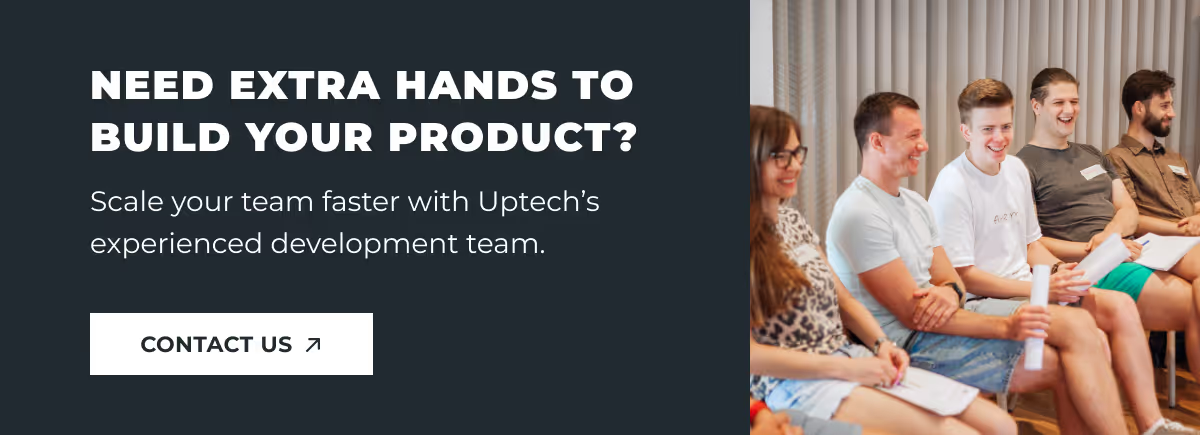
To Sum Up
By now, you can see that app development timelines aren’t one-size-fits-all — they depend on the product’s complexity, features, team expertise, and clarity of vision.
On average, creating a full-fledged app takes 7 to 12 months, including the discovery, design, development, and pre-launch stages.
In the end, the key to an efficient timeline is clarity, collaboration, and consistency. When the vision is aligned, communication is transparent, and the process is well-structured, even complex products can launch on time and within budget.
Clear requirements, timely responses, and shared responsibility are the go-pedals for the app development process. If you want to get a detailed estimation for your project, contact us to book a free consultation. We'll be happy to help you.
FAQs
1. What is a standard mobile app development timeline?
On average, it will take 2-4 months to develop a simple mobile app like a plain to-do list app, 4-7 months to develop a medium-complexity app like a fitness tracker, and 7-12+ months to develop a complex app like a social media platform or a mobile banking app.
2. How long does it take to develop an Android app?
To develop an Android app, you will typically need 1 to 3 months for simple apps, 3 to 6 months for apps of moderate complexity, and 6 months to a year or more for highly complex apps. App features, development approach, and team expertise significantly influence the timeline.
3. How long does it take to build an iOS app?
Building an iOS app can take 1 to 3 months for simple applications, 3 to 6 months for those with moderate complexity, and 6 months to over a year for highly complex apps. The exact timeline depends on the app's features, the team's experience, and the chosen development methodologies.






